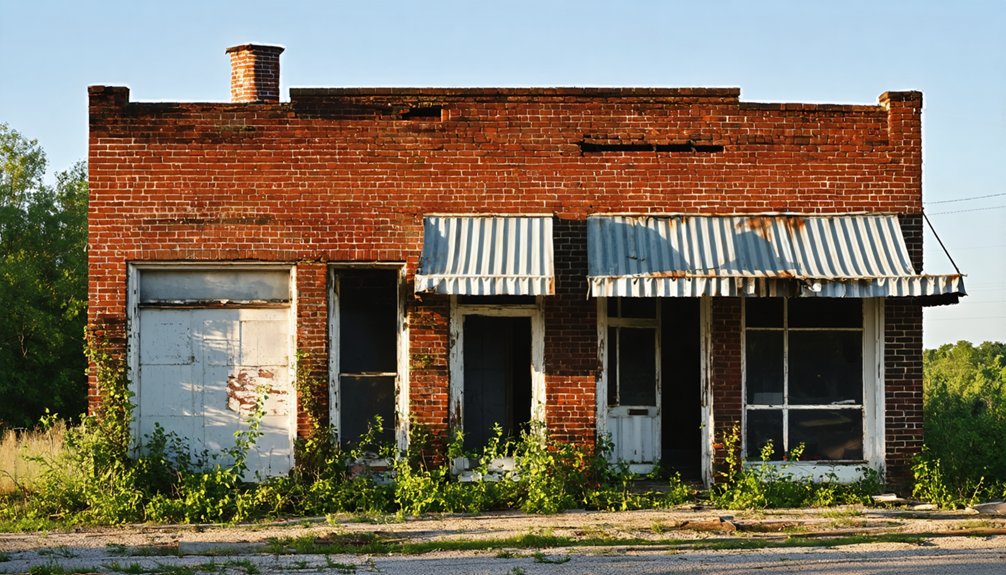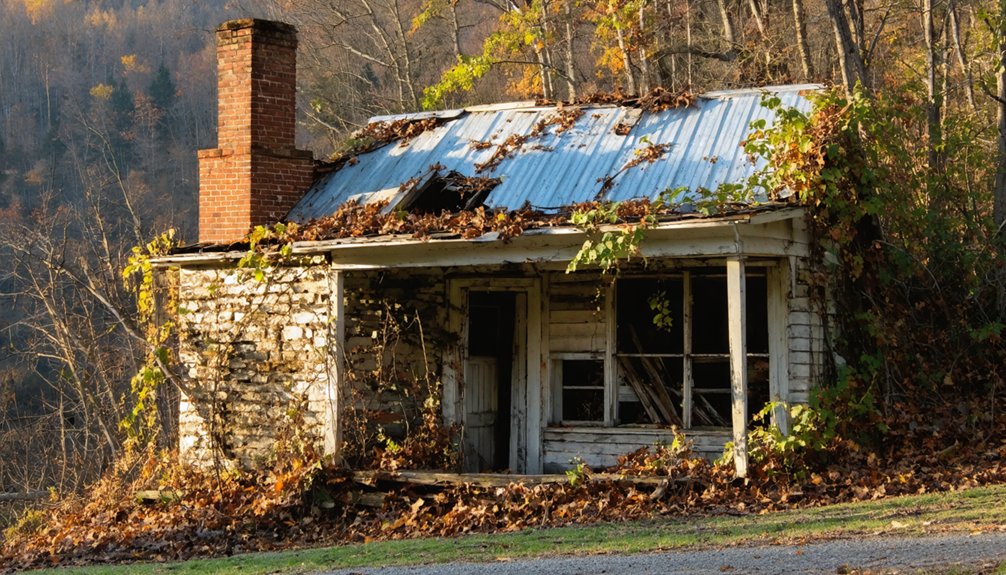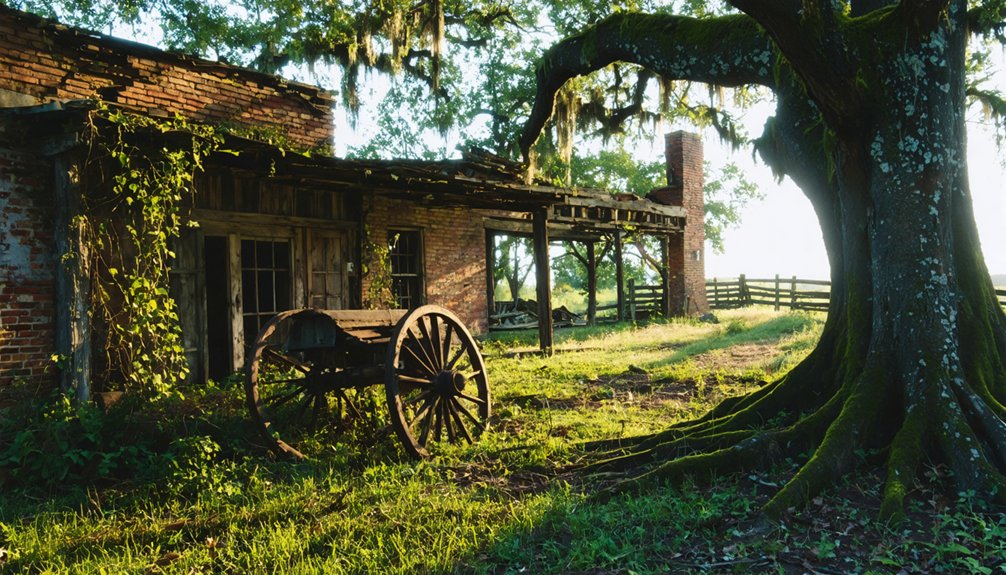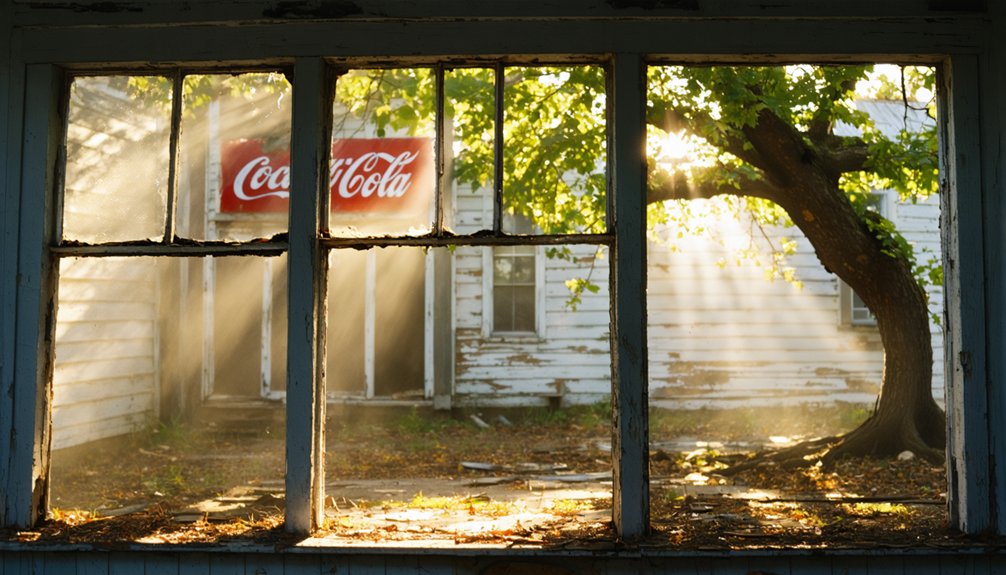You’ll find Chalk Bluff nestled on Crowley’s Ridge in northeastern Arkansas, where it once served as a crucial crossing point over the St. Francis River. This strategic location witnessed a pivotal Civil War battle in May 1863, featuring an innovative Confederate escape across makeshift bridges built from local logs and grapevines. Though the town declined after the railroad bypassed it in 1882, today’s Battlefield Park preserves its military significance through interpretive trails and overlooks that reveal a remarkable story of engineering and survival.
Key Takeaways
- Chalk Bluff transformed from a thriving river crossing settlement to a ghost town after the devastating Civil War Battle in May 1863.
- Disease outbreaks in military camps and post-battle infrastructure damage drove settlers and businesses away from the once-prosperous community.
- The town’s final decline occurred when the railroad bypassed Chalk Bluff in 1882, eliminating its importance as a transportation hub.
- Local legends and ghost stories persist about Confederate soldiers who died during the battle, attracting paranormal enthusiasts to the area.
- Today, Chalk Bluff Battlefield Park preserves the ghost town’s history with interpretive trails and markers detailing its strategic Civil War significance.
Rise and Fall of a Strategic River Town
Located at a critical juncture of the St. Francis River, Chalk Bluff emerged as an essential crossing point between Arkansas and Missouri.
You’ll find its historical significance tied to its position on Crowley’s Ridge, which provided the only passable route through the surrounding swamplands. The town’s strategic ferry crossing helped overcome significant logistical challenges, enabling trade and transit in an otherwise difficult terrain.
Before the Civil War, you could witness a thriving economic hub where merchants and travelers converged to cross the river. The area became a fierce battleground during General Marmaduke’s raid in 1863. Confederate forces demonstrated the location’s tactical advantage when they constructed a makeshift floating bridge to facilitate their escape.
However, the war transformed Chalk Bluff into a contested military stronghold, leading to its eventual downfall. After Union forces destroyed local infrastructure in 1863, the town never regained its commercial importance, ultimately fading into a ghost town preserved only in historical records.
The Battle That Changed Chalk Bluff’s Destiny
You’ll find Chalk Bluff’s pivotal moment in its May 1-2, 1863 battle, where Confederate General Marmaduke‘s forces clashed with Union troops at this strategic St. Francis River crossing point.
During the engagement, both sides fought fiercely over the high ground and river access, with Confederate forces ultimately escaping across makeshift bridges while suffering significant casualties.
The troops established strong defense lines at Four Mile village and Gravel Hill to protect their escape route.
Major Robert Smith and General M. Jeff Thompson led the bridge construction efforts, allowing the Confederate army to retreat safely into Arkansas.
The battle’s aftermath marked a turning point for the town, as its strategic importance diminished and its once-bustling riverfront activity began to wane.
Strategic River Crossing Location
When pioneers first established Chalk Bluff in the 1820s, they recognized the site’s exceptional strategic value at the intersection of the St. Francis River and Crowley’s Ridge.
You’ll find this prime location wasn’t chosen by chance – it offered vital advantages for river navigation and military logistics during the Civil War era. Due to potential naming confusion with other locations, it was crucial to refer to this site as Chalk Bluff, Arkansas.
- The white clay bluffs provided elevated ground overlooking the river, creating a natural defensive position.
- The crossing served as one of the few viable routes between Arkansas and Missouri through the surrounding swamplands.
- Abraham Seitz’s ferry operation made it a significant transit point for both civilian and military movements.
- The high ground’s position on Crowley’s Ridge created a natural corridor for troop movements and supply lines.
The site’s commanding position made it indispensable for both Union and Confederate forces seeking to control regional movement. This strategic importance was demonstrated in 1863 when Confederate General Marmaduke used the elevated terrain to mount a successful defensive stand against pursuing Union forces.
Decisive Military Engagement
The strategic value of Chalk Bluff became starkly apparent during the Battle of Chalk Bluff on May 1-2, 1863, as Confederate General John S. Marmaduke orchestrated a masterful withdrawal across the St. Francis River.
You’ll find the battle showcased innovative rearguard tactics, with Confederate forces establishing strong defensive positions on Gravel Hill’s elevated terrain.
Under cover of darkness, you would’ve witnessed soldiers constructing makeshift bridges while dealing with treacherous river dynamics.
The Confederates’ crude but effective breastworks held off repeated Union assaults, buying vital time for the main force’s escape.
While Union forces claimed strategic victory by ending Marmaduke’s raid, the Confederates’ tactical success at Chalk Bluff saved their army, though at a heavy cost of 210 casualties.
The engagement transformed this quiet river crossing into a pivotal Civil War battleground. Prior to this battle, Colonel Edward Daniels and his First Wisconsin Cavalry had successfully driven out Confederate threats in the region.
Post-Battle Town Decline
Following the Battle of Chalk Bluff in 1863, a series of cascading effects triggered the town’s steady decline.
You’ll find that infrastructure challenges crippled any chance of recovery, as military activities had redirected resources away from essential development. The town’s position on the Missouri-Arkansas border left it particularly vulnerable, and you’d have seen a dramatic economic decline as trade and commerce ground to a halt.
- Local businesses and settlers abandoned the area, seeking safer locations
- Agricultural production suffered from environmental degradation and lack of resources
- Infrastructure remained undeveloped, with no significant post-battle investment
- Disease spread through military camps, further destabilizing the remaining population
The combined impact of these factors transformed what was once a strategic location into a ghost town, leaving only historical markers to tell its story.
Military Engineering Marvel at St. Francis River
During the Civil War battle at Chalk Bluff, you’d have witnessed Confederate engineers constructing an ingenious floating bridge across the St. Francis River using locally sourced logs and grapevines under the supervision of Jeff Thompson.
You’ll find that this makeshift structure, while unable to support heavy artillery, allowed for a critical military crossing by combining a log raft for cannons with a floating bridge for troops.
When you consider the pressure of advancing Union forces, this rapid engineering solution exemplified the resourcefulness that helped Confederate forces maintain their strategic position at this essential Arkansas-Missouri border crossing. The 5,000 Confederate soldiers successfully crossed the bridge during the battle. The bridge proved vital for Marmaduke’s orderly retreat as his forces withdrew from Missouri back to Arkansas.
Bridge Design Under Pressure
Because military success hinged on rapid river crossings, Confederate engineers at Chalk Bluff devised an ingenious floating bridge system across the St. Francis River. Their military ingenuity shone through as they constructed a massive log structure nearly twice the river’s width.
Today, the Highway 62 bridge continues this legacy of critical river crossings at this historic location.
- Grapevines and ropes secured the floating bridge against swift currents, showcasing frontier resourcefulness.
- Special log rafts supported heavy artillery pieces during the essential crossing.
- Engineers built modular floating sections for quick assembly and disassembly.
- The bridge’s design enabled thousands of troops, both mounted and dismounted, to escape under pressure.
You’ll notice how the bridge’s construction balanced speed with strength, allowing Marmaduke’s forces to retreat while withstanding the weight of men, horses, and artillery.
This engineering feat proved critical for Confederate movements through this strategic bottleneck.
Makeshift Materials Save Army
The innovative use of local materials proved essential when Confederate forces needed a rapid escape across the St. Francis River in 1863.
You’ll find that the improvised engineering feat, led by Jeff Thompson, transformed logs from nearby barns into a floating bridge that spanned twice the river’s width. Local grape vines served as guy wires when rope supplies ran short.
While Shelby’s Missouri Cavalry and Carter’s Texas Cavalry held back Union pursuers, Thompson’s team worked under fire to construct a sturdy log raft for artillery transport.
The natural advantages of Crowley’s Ridge provided elevated ground for the operation. This masterful use of local materials enabled General Marmaduke’s forces to execute their fighting withdrawal from Missouri into Arkansas, turning potential disaster into a successful tactical retreat.
Engineering Against Union Forces
As Confederate forces faced mounting pressure at Chalk Bluff in late April 1863, Brigadier General John S. Marmaduke’s troops executed remarkable engineering tactics while under fire from pursuing Union forces.
Brigadier General “Jeff” Thompson led the resourceful solutions needed to cross the flooded St. Francis River.
You’ll appreciate these critical engineering achievements that saved Marmaduke’s army:
- Engineers constructed a floating bridge using logs from local barns, secured by grapevines and ropes
- A separate log raft transported heavy artillery across the swollen waters
- Defensive trenches and breastworks stretched from Four Mile to the river crossing
- Artillery positions on high ground provided covering fire during construction
The Confederate engineering marvel showcased frontier ingenuity as Thompson’s team worked through the night, moving artillery first to maintain defensive capabilities while completing the evacuation under enemy pressure.
From Bustling Crossing to Forgotten Settlement
Positioned strategically at an essential river crossing on Crowley’s Ridge, Chalk Bluff emerged as an important transit point between Arkansas and Missouri during the 19th century.
You’ll find its rich history woven with ghost stories and local legends, including tales of Confederate soldiers dumping Federal loot into the St. Francis River during their hasty retreat.
The town’s decline began when the railroad bypassed it in 1882, shifting commerce and travel to other routes.
As economic opportunities dwindled, residents gradually abandoned their homes in search of better prospects elsewhere.
What was once a bustling crossing point transformed into a silent reminder of the past.
Today, you can explore the remnants of this once-vital settlement through trails that wind through the forested valleys and ridges of Crowley’s Ridge.
Preserving the Legacy: Battlefield Park Today
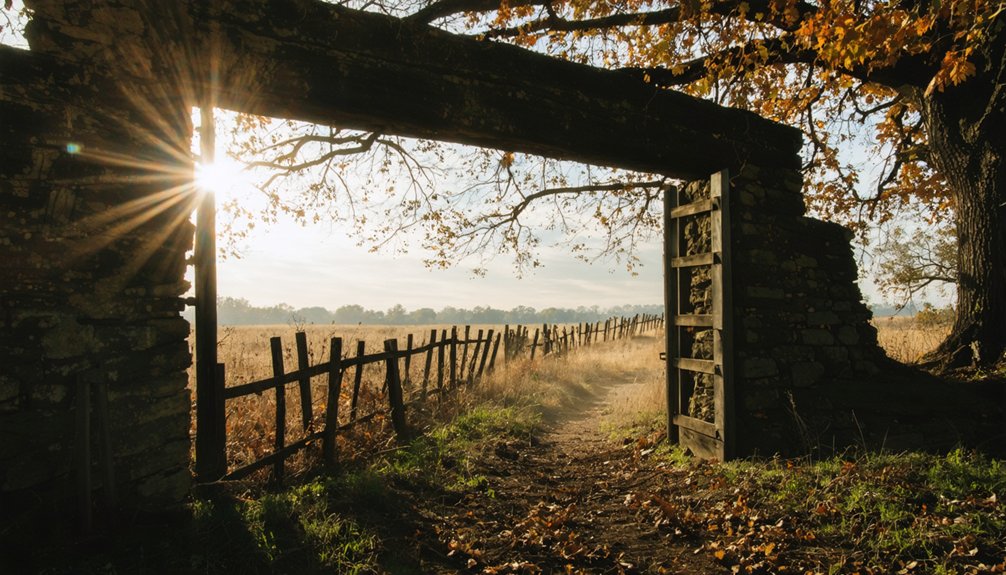
Modern visitors to Chalk Bluff can explore this historic Civil War site at Chalk Bluff Battlefield Park, where careful preservation efforts have transformed the former battleground into an educational landmark.
Through dedicated battlefield preservation initiatives, you’ll find a wealth of historical education opportunities along the one-mile loop trail.
- Take in the strategic importance of this Civil War crossing point while viewing the St. Francis River from a covered overlook.
- Walk the mix of paved and natural pathways, complete with interpretive markers detailing the May 1863 battle.
- Stop at multiple informational stations chronicling both Marmaduke’s raid and the area’s broader military significance.
- Enjoy modern amenities including picnic shelters, restrooms, and playground facilities while immersing yourself in Civil War history.
Natural Wonders and Historical Trails
While standing atop Crowley’s Ridge, you’ll discover Chalk Bluff’s remarkable natural wonders alongside its storied historical pathways. The white clay bluffs showcase the area’s natural beauty, where you can explore mile-long trails leading to stunning views of the St. Francis River.
You’ll find wooden walkways and railings guiding you through diverse ecosystems of knolls, ridges, and ravines. The trails also reveal the area’s historical significance through Civil War markers commemorating the 1863 Battle of Chalk Bluff.
You can traverse both paved and uneven terrain, stopping at the covered overlook for river views. Whether you’re interested in a quick 20-minute walk or spending the afternoon fishing, these trails offer a perfect blend of outdoor adventure and historical exploration.
Frequently Asked Questions
What Happened to the Original Buildings and Structures of Chalk Bluff?
Ever wonder what remains of frontier towns? You won’t find any architectural remnants – the original buildings were destroyed during Civil War battles and weren’t preserved, as residents abandoned the town for St. Francis.
Were There Any Native American Settlements Near Chalk Bluff Before the Town?
You’ll find evidence of Native American activity in the region, but there’s no definitive proof of permanent settlements at Chalk Bluff itself, though artifacts suggest they used nearby areas for hunting and travel.
How Deep Was the St. Francis River During Civil War Times?
You’d find the St. Francis River’s depth varied dramatically during the Civil War, with deep pools reaching 50-100 feet alongside shallow sections, making navigation tricky without established channels.
What Crops and Industries Sustained Chalk Bluff Before Its Decline?
You’ll find cotton farming served as the primary cash crop, while timber industry and river-based commerce thrived alongside corn, wheat, and small-scale vegetable gardens near the St. Francis River.
Did Any Famous Outlaws or Personalities Visit Chalk Bluff During Its Heyday?
Like a blank page in history’s book, you won’t find outlaw legends or notable visitors here. No Jesse James, Cole Younger, or other famous outlaws ever graced Chalk Bluff’s streets.
References
- https://en.wikipedia.org/wiki/Battle_of_Chalk_Bluff
- https://www.arkansas.com/st-francis/landmarks/chalk-bluff-battlefield-park
- https://encyclopediaofarkansas.net/entries/skirmish-at-chalk-bluff-1128/
- https://www.arkansasheritage.com/arkansas-natural-heritage/naturalareas/find-a-natural-area/chalk-bluff-natural-area
- https://www.hmdb.org/m.asp?m=4912
- https://www.hmdb.org/m.asp?m=18186
- https://www.allaboutarkansas.com/chalk-bluff-park-arkansas/
- https://theclio.com/entry/36143
- https://www.hmdb.org/m.asp?m=4911
- https://www.hmdb.org/m.asp?m=18141
